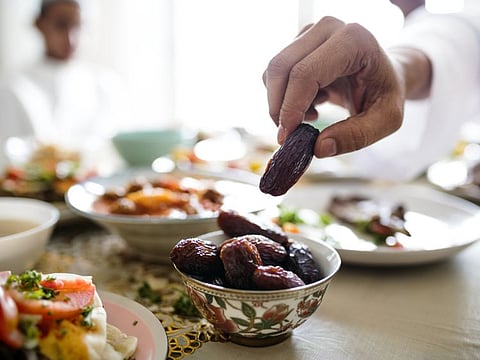Off the cuff: Time to detox your body and soul
Feature editors sadistically start printing mouth-watering foodstuff and recipes

Ramadan, or Ramzan, as it is known in the subcontinent, has begun and fasting will be for a gruelling 14½ hours in the summer heat.
“What are you moaning about?” said a friend in Hyderabad over the phone, when I told him how hot it was in Bengaluru, the “Garden City” of India, that is much higher up on the Deccan Plateau and much greener than my hometown.
(I remember seeing a bird drop down dead from a tree in summer in Hyderabad).
You have air-conditioning,” my friend said.
But every night we hear a huge thud and the air-conditioner suddenly shuts down, our UPS (uninterruptible power supply) that we had bought to keep ourselves online without interruption, starts bleeping every few seconds to warn us, and the fans slowly spin to a stop.
We live in a community that has a huge generator that whirrs into action as soon as the power goes off and it keeps everything working, except the air-conditioners, the fridge, the microwave, our tea kettle but the ceiling fans start turning and stirring hot breeze on our heads.
Fasting then turns into a challenge. “Keep yourself well hydrated,” say the doctors, advising on how to keep healthy and active during Ramadan. “Drink plenty of water at ‘suhoor’ (the meal that is eaten before dawn during the fasting month).
Nutritionists advise not to miss the ‘suhoor’ or the breakfast, and to eat proteins and carbs, slow digesting food to help make it last till 7pm, the time to break the fast, and to drink either yoghurt drinks and water, but no fizzy sugary drinks, as that give you a sugar rush and then immediately bring you down.
Fasting here does not mean that you are allowed certain foods and prohibited others, or that you can drink water or orange juice. It is a total ban on food and drink during the daylight hours and that has a detoxing effect and brings the energy level down.
The morning meal has a fixed time, after which one must stop eating; you cannot continue eating till say, 7am or 8am.
I usually get up when the time slot for ‘suhoor’ is very short as I tend to punch the snooze button on my alarm a couple of times. As I eat whatever leftovers are in the fridge, there is barely enough time or enough space in my tummy to drink water.
I also need my morning cup of tea, as I am addicted and get a mild headache if I miss it, (incidentally, it is not true that tea and coffee are diuretics, meaning that they make you dehydrated)
From hot tea I jump to cool water and realise I cannot take more than a few sips. In a panic I check the time: three minutes left. That is plenty of time, I say, and check Twitter to see how other people around the world are fasting.
Social media is a fast time-killer and I suddenly realise my three minutes are up. I shut the fridge door, open the window and hear the muezzin making the call to prayer.
During the fasting day feature editors in newspapers and magazines for some reason, turn sadists and start printing mouth-watering foodstuff and recipes.
I laugh weakly when the health freaks say this is a great time to exercise; go for a swim or a walk just before the end of the fast. It will tone up your body, they say.
There are some cities where fasting is for more than 20 hours. I am in awe of the people living there and their self-control.
Mahmood Saberi is a storyteller and blogger based in Bengaluru, India. Twitter: @mahmood_saberi.
Sign up for the Daily Briefing
Get the latest news and updates straight to your inbox



